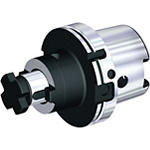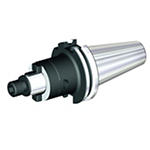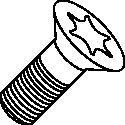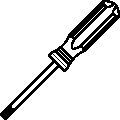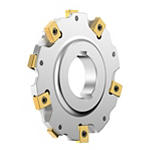Produkt ähnlich wie:
Narrow Slotting LN Series • Slotting width 6-12mm • Arbor Mount • Metric
Slot milling cutter for multiple materials.
Material Nummer1130626
ISO Katalog Nummer160H16NS90LN12N08ANSI Katalog Nummer160H16NS90LN12N08
Nutenfräsen: Schulter mit AE-/AP-Abmessungen
Sending to {{cadTool}} in progress...
Downloaded file will be available after import in the {{cadTool}} tool library.
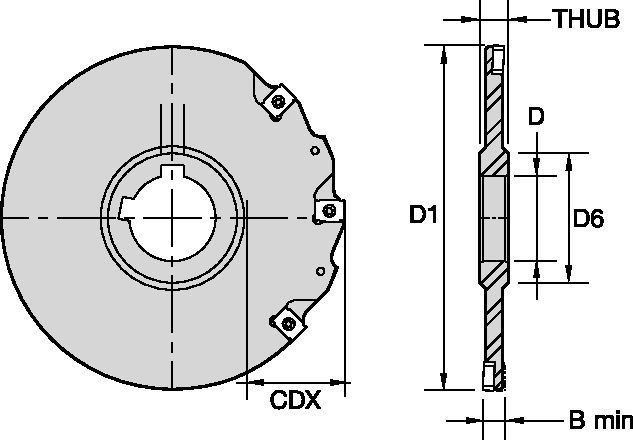
| Material Nummer | 1130626 |
| ISO Katalog Nummer | 160H16NS90LN12N08 |
| ANSI Katalog Nummer | 160H16NS90LN12N08 |
| [D1] Effektiver Schneidendurchmesser | 160 mm |
| [D1] Effektiver Schneidendurchmesser | 6.299 in |
| [D] Adapter/Schaft/Bohrungsdurchmesser | 40 mm |
| [D] Adapter/Schaft/Bohrungsdurchmesser | 1.574 in |
| [D6] Nabendurchmesser | 63 mm |
| [D6] Nabendurchmesser | 2.48 in |
| [BM] Schnittbreite Min. | 8 mm |
| [BM] Schnittbreite Min. | .315 in |
| [CDX] Radiale maximale Schnitttiefe | 46 mm |
| [CDX] Radiale maximale Schnitttiefe | 1.811 in |
| [THUB] Nabendicke | 12 mm |
| [THUB] Nabendicke | .4724 in |
| Anzahl der Schneidkörper | 16 |
| [Z] Anzahl der Spannuten | 8 |
| Wendeschneidplatten-Größe | LN__12__ |
| Gewicht Kilogramm | 1.3 |
Uses and application
Nutenfräsen: Schulter mit AE-/AP-Abmessungen
Features and benefits
- Easy cutting width adjustment through inserts with different thickness.
- Full side and face cutting.
- Two keyways for staggered mounting.
Lösung erstellen, um Vorschübe und Geschwindigkeiten zu berechnen
Nachdem Sie eine Lösung erstellt haben, wählen Sie einfach das Symbol für Vorschübe und Geschwindigkeiten und unser System gibt Ihnen Empfehlungen. Sie können die Informationen anpassen, indem Sie Ihre Maschine und Spezifikationen hinzufügen oder Anpassungen mithilfe der Schieberegler vornehmen.
Insert Selection
| LN Slotting Series • Insert Selection Guide | ||||||
| Werkstoffgruppe | Leichte Bearbeitung | Allgemeine Anwendung | Schruppbearbeitung | |||
| – | (Leicht schneidende Geometrie) | – | (Stabile Geometrie) | |||
| – | Verschleiß- festigkeit |  | Zähigkeit | |||
| – | Geometrie | Sorte | Geometrie | Sorte | Geometrie | Sorte |
| P1-P2 | LNEU… | KCPM40 | LNEU…SGP | KCPM40 | LNEQ... | KC725M |
| P3-P4 | LNEU… | KCPK30 | LNEU…SGP | KCPM40 | LNEQ... | KC725M |
| P5-P6 | LNEU… | KC725M | LNEU…SGP | KC725M | LNEQ... | KC725M |
| M1-M2 | LNEU… | KC725M | LNEU…SGP | KC725M | LNEQ... | KC725M |
| M3 | LNEU… | KCPM40 | LNEU…SGP | KCPM40 | LNEQ... | KC725M |
| K1-K2 | LNEU… | KCK20B | LNEU… | KCK20B | LNEQ... | KCK15 |
| K3 | LNEU… | KCK20B | LNEQ... | KCK20B | LNEQ... | KCK20B |
| N1-N2 | – | – | – | – | – | – |
| N3 | – | – | – | – | – | – |
| S1-S2 | LNEU… | KC725M | LNEU…SGP | KC725M | LNEQ... | KC725M |
| S3 | LNEU… | KCPK30 | LNEU…SGP | KCPM40 | LNEQ... | KC725M |
| S4 | LNEU… | KC725M | LNEU…SGP | KC725M | LNEQ... | KC725M |
| H1 | – | – | – | – | – | – |
Feeds
Recommended Starting Feeds [mm]
| LN Slotting Series • Recommended Starting Feeds [mm/th] | |||||||||||||||
| Schneidkörper- Geometrie | Empfohlener Start-Vorschub pro Zahn (fz) im Verhältnis zur radialen Schnitttiefe (ae) in % | ||||||||||||||
| 5% | 10% | 20% | 30% | 40–100% | |||||||||||
| L | M | H | L | M | H | L | M | H | L | M | H | L | M | H | |
| LNEU… | 0.17 | 0.47 | 0.7 | 0.12 | 0.34 | 0.5 | 0.09 | 0.26 | 0.38 | 0.08 | 0.22 | 0.33 | 0.07 | 0.2 | 0.3 |
| LNEU…SGP | 0.23 | 0.52 | 0.81 | 0.17 | 0.37 | 0.58 | 0.13 | 0.28 | 0.43 | 0.11 | 0.24 | 0.38 | 0.1 | 0.22 | 0.35 |
| LNEQ... | 0.23 | 0.59 | 0.95 | 0.17 | 0.43 | 0.68 | 0.13 | 0.32 | 0.51 | 0.11 | 0.28 | 0.44 | 0.1 | 0.25 | 0.41 |
| L = Light Machining; M = Medium Machining; H = Heavy Machining NOTE: Use "Light Machining" values as starting feed rate. | |||||||||||||||
| LN Slotting Series • Recommended Starting Feeds [IPT] | |||||||||||||||
| Schneidkörper- Geometrie | Empfohlener Start-Vorschub pro Zahn (fz) im Verhältnis zur radialen Schnitttiefe (ae) in % | ||||||||||||||
| 5% | 10% | 20% | 30% | 40–100% | |||||||||||
| L | M | H | L | M | H | L | M | H | L | M | H | L | M | H | |
| LNEU… | 0.007 | 0.019 | 0.027 | 0.005 | 0.013 | 0.02 | 0.004 | 0.01 | 0.015 | 0.003 | 0.009 | 0.013 | 0.003 | 0.008 | 0.012 |
| LNEU…SGP | 0.009 | 0.02 | 0.032 | 0.007 | 0.015 | 0.023 | 0.005 | 0.011 | 0.017 | 0.004 | 0.01 | 0.015 | 0.004 | 0.009 | 0.014 |
| LNEQ... | 0.009 | 0.023 | 0.037 | 0.007 | 0.017 | 0.027 | 0.005 | 0.013 | 0.02 | 0.004 | 0.011 | 0.017 | 0.004 | 0.01 | 0.016 |
| L = Light Machining; M = Medium Machining; H = Heavy Machining NOTE: Use "Light Machining" values as starting feed rate. | |||||||||||||||
Speeds
| LN Slotting Series • Recommended Starting Speed [m/min] | |||||||||||||||||||
| Schneidstoffsorte | KC520M | KC725M | KCK15 | KCPK30 | KCK20B | KCPM40 | |||||||||||||
| Spandicke hex mm | Min. | Max. | Min. | Max. | Min. | Max. | Min. | Max. | Min. | Max. | Min. | Max. | |||||||
| Werkstoffgruppe | Max. | Startwert | Min. | Max. | Startwert | Min. | Max. | Startwert | Min. | Max. | Startwert | Min. | Max. | Startwert | Min. | Max. | Startwert | Min. | |
| P | 1 | – | – | – | 260 | 230 | 215 | – | – | – | 455 | 395 | 370 | – | – | – | 295 | 260 | 245 |
| 2 | – | – | – | 220 | 190 | 160 | – | – | – | 280 | 255 | 230 | – | – | – | 250 | 215 | 180 | |
| 3 | – | – | – | 200 | 170 | 140 | – | – | – | 255 | 230 | 205 | – | – | – | 230 | 195 | 160 | |
| 4 | – | – | – | 180 | 150 | 120 | – | – | – | 225 | 185 | 160 | – | – | – | 205 | 170 | 135 | |
| 5 | – | – | – | 150 | 135 | 120 | – | – | – | 190 | 170 | 150 | – | – | – | 170 | 155 | 135 | |
| 6 | – | – | – | 130 | 100 | 80 | – | – | – | 160 | 135 | 110 | – | – | – | 150 | 115 | 90 | |
| M | 1 | – | – | – | 170 | 150 | 135 | – | – | – | 205 | 185 | 155 | – | – | – | 195 | 170 | 155 |
| 2 | – | – | – | 155 | 130 | 110 | – | – | – | 185 | 160 | 140 | – | – | – | 175 | 150 | 125 | |
| 3 | – | – | – | 115 | 100 | 80 | – | – | – | 145 | 130 | 115 | – | – | – | 130 | 115 | 90 | |
| K | 1 | 270 | 245 | 215 | – | – | – | 420 | 385 | 340 | 295 | 265 | 240 | 360 | 290 | 245 | – | – | – |
| 2 | 210 | 190 | 175 | – | – | – | 335 | 295 | 275 | 235 | 210 | 190 | 280 | 230 | 195 | – | – | – | |
| 3 | 175 | 160 | 145 | – | – | – | 280 | 250 | 230 | 195 | 175 | 160 | 210 | 175 | 140 | – | – | – | |
| N | 1 | – | – | – | – | – | – | – | – | – | – | – | – | – | – | – | – | – | – |
| 2 | – | – | – | – | – | – | – | – | – | – | – | – | – | – | – | – | – | – | |
| 3 | – | – | – | – | – | – | – | – | – | – | – | – | – | – | – | – | – | – | |
| S | 1 | – | – | – | 35 | 30 | 25 | – | – | – | – | – | – | – | – | – | 40 | 35 | 30 |
| 2 | – | – | – | 35 | 30 | 25 | – | – | – | – | – | – | – | – | – | 40 | 35 | 30 | |
| 3 | – | – | – | 45 | 35 | 25 | – | – | – | – | – | – | – | – | – | 50 | 40 | 30 | |
| 4 | – | – | – | 50 | 45 | 30 | – | – | – | 50 | 45 | 35 | – | – | – | 55 | 50 | 35 | |
| H | 1 | – | – | – | – | – | – | – | – | – | – | – | – | – | – | – | – | – | – |
| Recommended Starting Speed are pointing to 90° Shoulder Milling . Starting Speed for Face and Copy Milling can be Increased by 20 %. As the average chip thickness increases, speed should be decreased. Material groups P, M, K and H show recommended starting speeds for dry machining. For wet machining, reduce speed by 20%. Material groups N and S show recommended starting speeds for wet machining. Not recommended for dry machining. | |||||||||||||||||||
| LN Slotting Series • Recommended Starting Speed [SFM] | |||||||||||||||||||
| Schneidstoffsorte | KC520M | KC725M | KCK15 | KCPK30 | KCK20B | KCPM40 | |||||||||||||
| Chip Thickness hex Inch | Min. | Max. | Min. | Max. | Min. | Max. | Min. | Max. | Min. | Max. | Min. | Max. | |||||||
| Werkstoffgruppe | Max. | Startwert | Min. | Max. | Startwert | Min. | Max. | Startwert | Min. | Max. | Startwert | Min. | Max. | Startwert | Min. | Max. | Startwert | Min. | |
| P | 1 | – | – | – | 855 | 755 | 705 | – | – | – | 1495 | 1295 | 1215 | – | – | – | 970 | 855 | 805 |
| 2 | – | – | – | 720 | 625 | 525 | – | – | – | 920 | 835 | 755 | – | – | – | 820 | 705 | 590 | |
| 3 | – | – | – | 655 | 560 | 460 | – | – | – | 835 | 755 | 675 | – | – | – | 755 | 640 | 525 | |
| 4 | – | – | – | 590 | 490 | 395 | – | – | – | 740 | 605 | 525 | – | – | – | 675 | 560 | 445 | |
| 5 | – | – | – | 490 | 445 | 395 | – | – | – | 625 | 560 | 490 | – | – | – | 560 | 510 | 445 | |
| 6 | – | – | – | 425 | 330 | 260 | – | – | – | 525 | 445 | 360 | – | – | – | 490 | 375 | 295 | |
| M | 1 | – | – | – | 560 | 490 | 445 | – | – | – | 675 | 605 | 510 | – | – | – | 640 | 560 | 510 |
| 2 | – | – | – | 510 | 425 | 360 | – | – | – | 605 | 525 | 460 | – | – | – | 575 | 490 | 410 | |
| 3 | – | – | – | 375 | 330 | 260 | – | – | – | 475 | 425 | 375 | – | – | – | 425 | 375 | 295 | |
| K | 1 | 885 | 805 | 705 | – | – | – | 1380 | 1265 | 1115 | 970 | 870 | 785 | 1180 | 950 | 805 | – | – | – |
| 2 | 690 | 625 | 575 | – | – | – | 1100 | 970 | 900 | 770 | 690 | 625 | 920 | 755 | 640 | – | – | – | |
| 3 | 575 | 525 | 475 | – | – | – | 920 | 820 | 755 | 640 | 575 | 525 | 690 | 575 | 460 | – | – | – | |
| N | 1 | – | – | – | – | – | – | – | – | – | – | – | – | – | – | – | – | – | – |
| 2 | – | – | – | – | – | – | – | – | – | – | – | – | – | – | – | – | – | – | |
| 3 | – | – | – | – | – | – | – | – | – | – | – | – | – | – | – | – | – | – | |
| S | 1 | – | – | – | 115 | 100 | 80 | – | – | – | – | – | – | – | – | – | 130 | 115 | 100 |
| 2 | – | – | – | 115 | 100 | 80 | – | – | – | – | – | – | – | – | – | 130 | 115 | 100 | |
| 3 | – | – | – | 150 | 115 | 80 | – | – | – | – | – | – | – | – | – | 165 | 130 | 100 | |
| 4 | – | – | – | 165 | 150 | 100 | – | – | – | 165 | 150 | 115 | – | – | – | 180 | 165 | 115 | |
| H | 1 | – | – | – | – | – | – | – | – | – | – | – | – | – | – | – | – | – | – |
| Recommended Starting Speed are pointing to 90° Shoulder Milling . Starting Speed for Face and Copy Milling can be Increased by 20 %. As the average chip thickness increases, speed should be decreased. Material groups P, M, K and H show recommended starting speeds for dry machining. For wet machining, reduce speed by 20%. Material groups N and S show recommended starting speeds for wet machining. Not recommended for dry machining. | |||||||||||||||||||
CAD Drawings Models
Can’t find the file type you’re looking for?
Product data
I have read and accepted the Terms & Conditions of use
